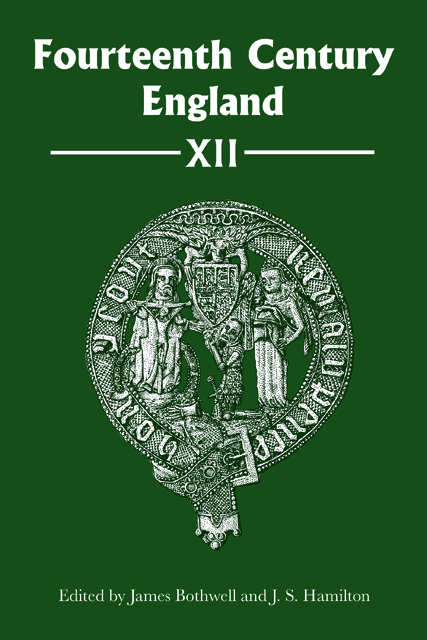Book contents
- Frontmatter
- Contents
- List of Illustrations
- List of Contributors
- Preface
- Abbreviations
- The King’s Confessors and the Royal Conscience in Late Medieval England
- ‘Such maintenance as …’: Corrodies of the Crown
- ‘Vos maisons sount pris al eops le counte’: Walter Bedwyn, Treasurer of York, and the Return of Piers Gaveston
- The Deposition of Edward II: The Kenilworth Embassies
- The English Parliament and the Trial of the ‘Peers of the Land’ in Henry of Lancaster’s Revolt (1328–29): The Origins of a Privilege
- A Brotherhood Uncovered: Investigating the Knightly Following of Thomas Beauchamp, earl of Warwick, 1329–69
- The Black Death and Clerical Prospects in England
- The Last of the Duketti? Richard II, Henry of Monmouth and the House of Lancaster
- Confusion Confounded? The Contrasting Military Fortunes of Sir William Neville (d. c.1391) and Sir William Neville of Pickhill and Rolleston (d. c.1420)
Preface
Published online by Cambridge University Press: 11 January 2023
- Frontmatter
- Contents
- List of Illustrations
- List of Contributors
- Preface
- Abbreviations
- The King’s Confessors and the Royal Conscience in Late Medieval England
- ‘Such maintenance as …’: Corrodies of the Crown
- ‘Vos maisons sount pris al eops le counte’: Walter Bedwyn, Treasurer of York, and the Return of Piers Gaveston
- The Deposition of Edward II: The Kenilworth Embassies
- The English Parliament and the Trial of the ‘Peers of the Land’ in Henry of Lancaster’s Revolt (1328–29): The Origins of a Privilege
- A Brotherhood Uncovered: Investigating the Knightly Following of Thomas Beauchamp, earl of Warwick, 1329–69
- The Black Death and Clerical Prospects in England
- The Last of the Duketti? Richard II, Henry of Monmouth and the House of Lancaster
- Confusion Confounded? The Contrasting Military Fortunes of Sir William Neville (d. c.1391) and Sir William Neville of Pickhill and Rolleston (d. c.1420)
Summary
The nine essays in the current volume address key issues in the history of the fourteenth century in a variety of ways. Longitudinal studies of king’s confessors and corrodies of the crown provide insights into the intersection of political, religious and demographic currents over the longue durée and are complemented by studies of documentary sources of various kinds – newsletters, chronicles and municipal archives – to challenge current understandings of key events such as the deposition of Edward II, the evolving identity of the parliamentary peers and Richard II’s vision for the house of Lancaster. More prosopographical and biographical studies of post-plague clerics, and of knights within comital affinities and within their own individual affinity groups, shed light on county communities and gentry society in the long fourteenth century, as well as the impact of the Black Death on society at large, but particularly on religious continuity and discontinuity at the parish level.
As always, the editors of this volume are grateful to the other members of the FCE editorial board, especially those who have recently joined us. Their support and advice, as well as that of Caroline Palmer and everyone at The Boydell Press, continues to be fundamental to this enterprise. We look forward to returning in person to the International Medieval Congress at Western Michigan University in Kalamazoo as well as the International Congress at the University of Leeds, where the papers sponsored by the Society of the White Hart and the Fourteenth Century Society have led to so many fruitful exchanges of ideas, many of which have made their way into the pages of this journal.
The contributors to this volume, as well as the editors and publisher, have been forced to adapt to unforeseen circumstances that have challenged one and all. The inability to access archives and libraries, coupled with the demands of new pedagogical techniques that had to be adopted seemingly overnight, were professional disruptions matched only by the profound personal difficulties presented by the loss of loved ones, enforced separations and isolation and the often debilitating uncertainly that has been unleashed in the COVID-19 pandemic. It is the editors’ hope that this volume of essays is a small testament to the resilience of the human spirit and the enduring value of the study of humanity’s past as we navigate an uncertain present.
- Type
- Chapter
- Information
- Fourteenth Century England XII , pp. xi - xiiPublisher: Boydell & BrewerPrint publication year: 2022

